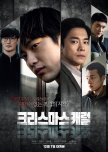This review may contain spoilers
This is NOT a revenge movie (my opinion).
This film makes me angry, but not for the reason most people mention. It’s not the violence itself that unsettles me, nor the fact that it’s yet another dark revenge movie: it’s the illusion it carries. A Christmas Carol seems to ask me to cheer for vengeance; yet, watching it, I see something else entirely: a young man who isn’t seeking justice but is punishing himself for not being there.
Park Jin-young carries the entire film on his shoulders with a double role that feels like an indictment aimed directly at the audience. On one side, he portrays the neurodivergent brother: a contracted body, uneven breathing, eyes searching for connection in a world that shuts him out. On the other, he becomes Il-woo: clenched jaw, evasive stride, hollow gaze. His brilliance lies in the smallest details — the way his posture shifts, the way his voice either drops or hardens — and in making us feel that the two brothers aren’t true opposites, but rather two poles of the same solitude.
Context matters. In Korea, anyone perceived as “different” pays a heavy price: disability, mental health struggles, being an orphan… all carry stigma. The film doesn’t turn this into an overt manifesto, but the trace is there: both brothers are already marked as losers before the story even tightens its grip. And here is what burns the most for me: I understand Il-woo’s exhaustion. Living alongside someone vulnerable can be draining; fatigue wins sometimes. But there’s a difference between fatigue and indifference. And Il-woo, as I see it, crosses that line: he stops looking, stops listening, stops being present.
SPOILER. The younger brother’s death is not “just” the result of beatings and bullying. If you watch without expecting catharsis, the film clearly shows sexual violence as the real cause. And it isn’t inflicted by the usual convenient villains, but by someone trusted — a figure Il-woo never even thinks to suspect. Here lies the decisive point: the “revenge” he pursues doesn’t arise from the truth of what happened; it comes from an attempt to numb his guilt. He cannot (or will not) see what really occurred, because he would first have to look inward and admit that he had already abandoned his brother while he was alive. If that boy had come home with bruises, I fear Il-woo would not have noticed. He had already lost him the moment he chose to turn away.
That is why I cannot read this as a “successful” revenge film. Everything that follows is pure substitution: Il-woo creates a visible enemy so he doesn’t have to face the invisible one; he turns pain into a mission because a mission provides meaning, whereas grief does not. The violence he inflicts on the world isn’t justice, it’s self-punishment disguised as action. It doesn’t “fix” anything; it simply puts distance between him and the only truth that matters: he failed to protect the one who depended on him.
The direction (cold, claustrophobic) underscores how much moral myopia pervades the story: corridors that close in, spaces that compress, a staging that pretends to breathe action but really suffocates. Even when the plot accelerates, I don’t feel release: I feel delay. Every act of retribution comes too late, aimed at the wrong target. It’s a chain of substitutions: striking what can be struck, because what must be named is untouchable — by shame, by fear, by impotence.
If I must explain why Park Jin-young’s performance feels so powerful to me, it’s also because Il-woo is never a “tragic hero.” He is a guilty figure in the most human and painful sense: he didn’t commit the violence himself, but he allowed it to happen in his absence. And when he finally acts, he does so too late and in the wrong direction. The double role becomes a merciless device: in every frame, it feels like witnessing an inner trial where both the defendant and the victim share the same face.
Those who want revenge here will find action. Those who seek the truth will find a void. And it’s that void that angers me: not because the film “offers no answers,” but because it shows the wrong answer becoming the narrative. The result is not redemption — not even effective vengeance — but a grief that can never complete itself. No balance is restored, no order returns: there remains only a boy who understands too late, too poorly, and has no idea where to put his hands.
To me, A Christmas Carol is this: not the muscular tale of someone “taking justice into his own hands,” but the confession of someone who cannot say I’m sorry to the right person at the right time. So he speaks with fists, with knives, with fury — because speaking with guilt requires a courage the film, deliberately, never grants. There is no redemption where pain was ignored before it was violated.
Seen this way, my anger makes sense. Not against the film as such — which is harsh, consistent in its chill, superbly acted — but against the comfortable idea that vengeance equals understanding. Here, nothing is understood: there is only punishment. And punishment, as we know, is never healing.
Park Jin-young carries the entire film on his shoulders with a double role that feels like an indictment aimed directly at the audience. On one side, he portrays the neurodivergent brother: a contracted body, uneven breathing, eyes searching for connection in a world that shuts him out. On the other, he becomes Il-woo: clenched jaw, evasive stride, hollow gaze. His brilliance lies in the smallest details — the way his posture shifts, the way his voice either drops or hardens — and in making us feel that the two brothers aren’t true opposites, but rather two poles of the same solitude.
Context matters. In Korea, anyone perceived as “different” pays a heavy price: disability, mental health struggles, being an orphan… all carry stigma. The film doesn’t turn this into an overt manifesto, but the trace is there: both brothers are already marked as losers before the story even tightens its grip. And here is what burns the most for me: I understand Il-woo’s exhaustion. Living alongside someone vulnerable can be draining; fatigue wins sometimes. But there’s a difference between fatigue and indifference. And Il-woo, as I see it, crosses that line: he stops looking, stops listening, stops being present.
SPOILER. The younger brother’s death is not “just” the result of beatings and bullying. If you watch without expecting catharsis, the film clearly shows sexual violence as the real cause. And it isn’t inflicted by the usual convenient villains, but by someone trusted — a figure Il-woo never even thinks to suspect. Here lies the decisive point: the “revenge” he pursues doesn’t arise from the truth of what happened; it comes from an attempt to numb his guilt. He cannot (or will not) see what really occurred, because he would first have to look inward and admit that he had already abandoned his brother while he was alive. If that boy had come home with bruises, I fear Il-woo would not have noticed. He had already lost him the moment he chose to turn away.
That is why I cannot read this as a “successful” revenge film. Everything that follows is pure substitution: Il-woo creates a visible enemy so he doesn’t have to face the invisible one; he turns pain into a mission because a mission provides meaning, whereas grief does not. The violence he inflicts on the world isn’t justice, it’s self-punishment disguised as action. It doesn’t “fix” anything; it simply puts distance between him and the only truth that matters: he failed to protect the one who depended on him.
The direction (cold, claustrophobic) underscores how much moral myopia pervades the story: corridors that close in, spaces that compress, a staging that pretends to breathe action but really suffocates. Even when the plot accelerates, I don’t feel release: I feel delay. Every act of retribution comes too late, aimed at the wrong target. It’s a chain of substitutions: striking what can be struck, because what must be named is untouchable — by shame, by fear, by impotence.
If I must explain why Park Jin-young’s performance feels so powerful to me, it’s also because Il-woo is never a “tragic hero.” He is a guilty figure in the most human and painful sense: he didn’t commit the violence himself, but he allowed it to happen in his absence. And when he finally acts, he does so too late and in the wrong direction. The double role becomes a merciless device: in every frame, it feels like witnessing an inner trial where both the defendant and the victim share the same face.
Those who want revenge here will find action. Those who seek the truth will find a void. And it’s that void that angers me: not because the film “offers no answers,” but because it shows the wrong answer becoming the narrative. The result is not redemption — not even effective vengeance — but a grief that can never complete itself. No balance is restored, no order returns: there remains only a boy who understands too late, too poorly, and has no idea where to put his hands.
To me, A Christmas Carol is this: not the muscular tale of someone “taking justice into his own hands,” but the confession of someone who cannot say I’m sorry to the right person at the right time. So he speaks with fists, with knives, with fury — because speaking with guilt requires a courage the film, deliberately, never grants. There is no redemption where pain was ignored before it was violated.
Seen this way, my anger makes sense. Not against the film as such — which is harsh, consistent in its chill, superbly acted — but against the comfortable idea that vengeance equals understanding. Here, nothing is understood: there is only punishment. And punishment, as we know, is never healing.
Was this review helpful to you?













